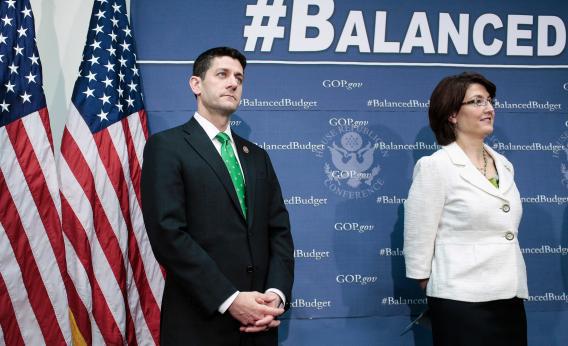Jake Sherman gets his mitts on an internal poll about the GOP’s new-old-new balanced budget strategy. Careful readers of Paul Ryan’s budget know that it doesn’t actually specify what taxes people will pay or what will be cut in order for the budget to come into balance. Tax rates of 15 and 25 percent, which previously balanced the budget in 25 years, now do it in 10. But Republicans skip past the math and say that their budget is balanced. Why?
Republicans say they’re trying to seize the message “balanced” back from President Barack Obama, who said last week he doesn’t consider balancing the budget a top priority… The poll showed that 45 percent of Democratic voters think “balancing … the federal budget would significantly increase economic growth and create millions of American jobs.” A sky-high 61 percent of independents and 76 percent of Republicans agree.
But the data Republicans culled are much more granular than that.
Sixty-four percent of voters in Democratic-held districts — dubbed offensive districts by the NRCC — think balancing the budget creates a massive number of jobs.
Now, if this were true, recent history would have been one of constant recessions. The wild deficits of the 1980s wouldn’t have come during a period of massive economic growth. The job growth and deficits of the middle Bush II years, when unemployment fell to around 5 percent, wouldn’t make any sense. And it wouldn’t have made any sense, in 2001, when Republican economists argued that the surplus needed to be wiped out to pay for more tax cuts—and unbalancing the budget—in the interest of economic stimulus.
But none of this is supposed to make sense. Voters associate “balancing” with good governance and economic results. You see this in the National Republican Senatorial Committee’s messaging. This morning, the group pointed reporters to analyses of the various budgets by the Peterson-aligned CRFB. According to their analysis, the more aggressively left-wing Democratic alternatives to the Senate budget, which raised taxes, were “slightly more aggressive on debt reduction.” The NRSC spin:
The Senate Democrat budget is to the left of the Congressional Black Caucus Budget (CBC) … and the Congressional Progressive Caucus - made up of the 75 most liberal members of the House of Representatives and Senator Bernie Sanders, a self described “Democratic Socialist.”
Catch the flying talking point! In no time at all, we’ve gone from defining higher taxes as left-wing—which has the benefit of being true—to defining a comparatively larger debt-to-GDP ratio as being left-wing. And by shifting the discussion from deficits to balanced budgets, we don’t need to talk about how current policy is leading (slowly) to smaller deficits.
